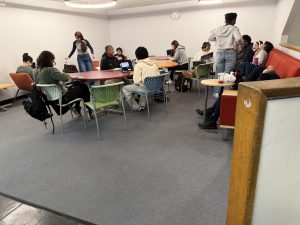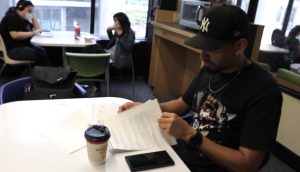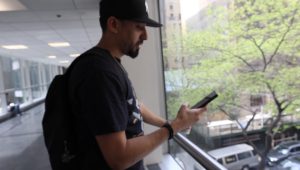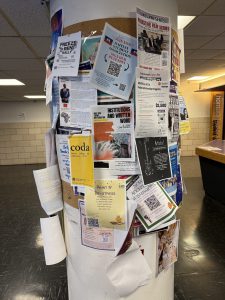
At Hunter College, it’s easy to feel the pulse of a traditional college experience: students pour into the buildings from subway stops, chatting about exams and weekend plans, crowding around coffee carts and campus corners. But for a growing group of students—many in their late 20s, 30s, and beyond—the return to college is less about fitting into that rhythm and more about carving a new one.
Their presence is quieter, less visible in student lounges or campus clubs, but no less impactful. They bring life experience, maturity, and a determination forged by responsibility.
The challenges begin before the first class even starts. For many older students, commuting to Hunter means rising early to take care of morning routines at home, including packing lunches for kids, checking in on elderly parents, or prepping for a work shift before or after class. The daily commute can span multiple boroughs, with students catching early trains from the Bronx, Queens, Staten Island, or even parts of Long Island and Westchester County.
These commutes aren’t just about geography—they reflect a larger balancing act. Every hour spent on the subway is one less hour for studying, working, or resting. Planning becomes critical. A missed train or delayed bus could mean arriving late to class or missing it altogether. Every day for nontraditional students feels like a logistical puzzle that requires constant readjustment.

“Balancing my responsibilities outside of school has been challenging but manageable with discipline and purpose,” said William Gonzalez, 39, a full-time nontraditional student majoring in media and digital film production, who hopes to become a documentarian.
“I work full-time from 9 a.m. to 5 p.m., Monday through Friday, and attend classes in the evenings on Mondays, Wednesdays, and Friday mornings before heading to work. Most weekends are spent catching up on assignments rather than relaxing, but I’ve learned to prioritize my time and stay organized,” he said. “While it’s not always easy, I stay motivated by reminding myself why I’m doing this—pursuing a degree to create better opportunities for myself. As an adult, I’ve accepted that achieving meaningful goals often requires sacrifice and commitment.”
Inside the classroom, the age gap between nontraditional students and their younger peers can feel wide. While traditional-aged students may be adjusting to independence for the first time, older students often arrive with a more profound sense of who they are and what they’re here to accomplish. They’re not exploring—they’re focused.
“While I don’t necessarily feel out of place, I am aware of the age gap sometimes,” Gonzalez added. “I often look around and see students who remind me of my younger self—full of energy, sometimes distracted, and still figuring things out.” Rather than letting that distance create discomfort, he says, he uses it to remind him how far he’s come. He also sees it as an opportunity to share his life experiences with students. “I stay focused on my goals and try to set an example through my work ethic and commitment,” said Gonzalez.

This focus can set them apart socially, sometimes creating a sense of isolation. Many older students skip out on campus events, not out of disinterest, but because they simply don’t have the time. They head straight home after class or to their next job shift. Building friendships can be complicated when little overlap in lifestyle or free time exists.
Still, that divide doesn’t always mean disconnect. Many nontraditional students find common ground with their younger classmates during group work or class discussions. Their lived experiences often bring a unique perspective to assignments and conversations. Whether discussing labor rights in a political science class or analyzing generational trends in media, they get insight shaped by years outside the classroom.
Despite the challenges, nontraditional students often exhibit strong academic discipline. They’re more likely to attend every class, complete assignments on time, and actively participate in discussions–not because they’re trying to impress, but because they’ve worked hard just to be in the room. In NACE’s 2024 Student Survey, nontraditional-aged students—those 25 years or older—constituted 24% of the sample. These students were enrolled across both undergraduate and graduate programs. The survey revealed that nontraditional students are less likely to utilize campus career centers, with only 38% visiting them compared to 51% of traditional-aged students.

Additionally, only 29% of nontraditional students attended career fairs in the past year, compared to nearly half of their younger counterparts. According to the NCES IPEDS data for Fall 2023, more than 6 million students aged 25 and over were enrolled in postsecondary institutions, representing almost a third of the total enrollment of about 19 million. For many, this return to education is deeply personal. Some are finishing degrees they started years ago. Others are pivoting careers or setting an example for their children. The decision to return to school isn’t made lightly, and the stakes often feel higher.
The Advising Department at Hunter supports adult and returning students. It provides resources to help them navigate college life and succeed academically. Advisors understand the unique challenges these students may face. The department also encourages connections among students with similar life experiences.
Still, the most considerable support often comes from within. Nontraditional students carry a strong internal drive—a determination to move forward, create change, and achieve something for themselves, no matter how long or hard it takes. They don’t only want the degree; they’ve earned the life that brings them to it.
Being a nontraditional student at Hunter College is not about catching up or blending in. It’s about showing up—every day, with commitment and courage—and proving that education doesn’t belong to any one age or stage of life. It belongs to those who keep going.

